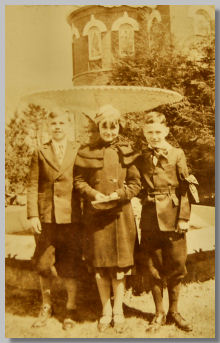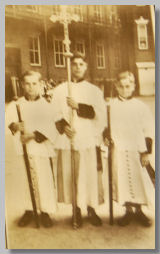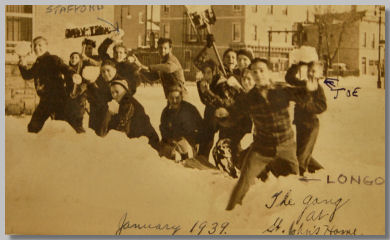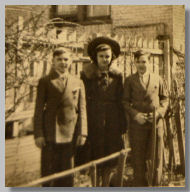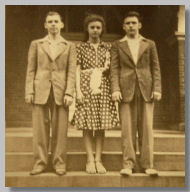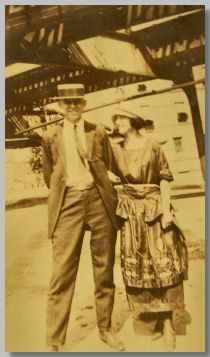
Ernest Wirsich and his older brother were raised by Dominican nuns in Long Island during the Great Depression. Because of the fond memories he has of those years, Ernest, for the last fifteen years, has made it a tradition to visit Sister Mary Ann Cirillo and Sister JoAnn Fleischaker every Thanksgiving at Roman Nose State Park.
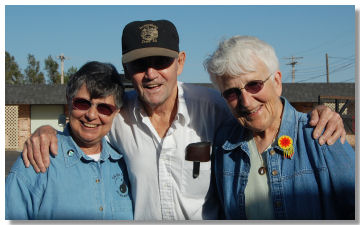
These Sisters have worked with the Las-Casas program which ministered to the Cheyenne and Arapaho tribes in and around Canton from 1977 to 2004. They continue to work with the Indians through youth programs, death and grief counseling, music therapy and T'ai Chi Chih programs.
Ernest visits the two sisters because he is so thankful for the other Dominican nuns that raised he and his older brother, Joe when they were in the Nazareth Trade School Orphanage in Farmingdale, Long Island so many years ago. As a child he would receive from the nuns what they called a 'heavy box'. This was a shoe box full of hard candy and nuts and hard crackers. It was a treasured gift that all the boys would hide from each other per chance it got stolen by one of the older boys.
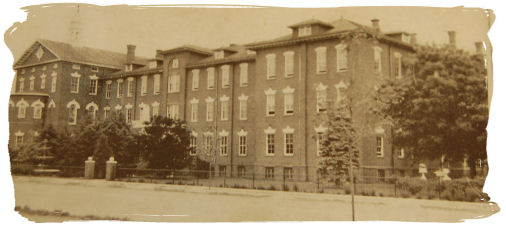
Ernest's earliest memory is of his brother taking him by the hand and leading him inside the orphanage when he was five. That was 1930 and this is his story:
|
Sister Solona was my teacher. The boys in the dormitory below us had Italian nuns. In the evening we all said our prayers and then we would fall asleep listening to all the boys singing 'Good Night Sweet Jesus." We had good food, good schooling, clean clothes and acres and acres of playground. And there was always enough boys to make a game. (My cousins who were in the city had to play in the street.) If I had to be
in a place,
My Dad came to see us every Sunday. He would take us into
Farmingdale Village to the Gluck's Restaurant. We all three would eat and all Gluck would charge was $1. He knew we hadn't a lot of money. I don't know how my dad came out every Sunday with railroad fare and all; but in those years, the conductor would say, "Oh, I know that guy, he's got kids in the orphanage'. And he would turn and look the other way. We were poor; but nobody knew it because everyone else was too. Wirsich is a German name. My father spelled his name 'Wirsick' until the Navy misspelled the name on official paperwork. The error stuck and he still spells his name with a 'h'.
My Dad was good friends with the head prefect, Harry Fleck, there in Farmingdale and we would use his room on Sunday afternoons. We would listen to his radio and Dad would bring the Sunday paper and I remember reading the comics. Our buddies would sit outside the door with their ears pressed to the door trying to listen to the radio because they thought that was cool. We would give them the funnies when we were through reading them. On Friday, when we were not served meat, the nuns would serve what they called 'chopped-up'. It was stale bread, raisins and celery. This was fried together and put in huge vats. After you ate your fill, you put more in sacks or just in your pockets if you had no sack. You could always tell what boys didn't have containers for this dish because you could see the grease soaking through their jeans. Hey, but it was too good to throw away, so we ate it. There was a big chicken farm at the orphanage. When my brother graduated elementary school, he began work on the farm. He would get up at 4:00 am to feed the chickens before school. We also had cows and horses. We ate the potatoes and corn raw when we were working. We were always hungry. Joe, Anna and Ernie at Ernie's confirmation, 1937
I was a sickly child, so I didn't get to work a lot. I had black diphtheria when I was two and it injured one of my kidneys. I didn't get to do all the things that my older brother did. He studied Latin and became one of the altar boys at the parish across the street.
And when he was old enough he entered the service and was able to fight for his country in the war.
Joe and two other boys ready to serve as altar boys.
After ten years in this orphanage we were transferred to St. John's Home in Brooklyn. A quick visit from Dad at St. John's Eventually they sold the school building to the Army when the war broke out. Since then, it has been torn down. It was a beautiful building; it would have lasted forever. We eventually left St. John's when the head priest there insisted that I have surgery to remove my bad kidney. My father didn't think I was old enough to have that surgery. Because of that disagreement we left.
I tried to enlist in the Navy; but they didn't want me. I went to the Marines and they said, 'Go Home'. I tried to get into the army; they sent me to Governor's Island for two weeks for a physical. Then they told me to go home and that I would hear from them in 6 months. They finally sent me a 5H card which means that they would take women and children before they would take me. I wanted badly to serve my country; everybody wanted to serve their country. There was a lady at the defense plant where I was employed who would hassle me about not serving my country because her son and grandson and cousins and uncles were overseas. I said, "Lady, please, I tried!". I can't say enough about the Dominican nuns. I have good memories of the nuns who took such good care of me and my brother during the depression. That is why I was so happy to meet Sister Mary Ann and Sister JoAnn. I help them with their programs around Canton and treat them to a Thanksgiving meal and they bring me a 'heavy box' for old times' sake.
|
more information about the Nazareth Trade School:
This is a letter that Ernest received from Judy Cave from the Willard
Weber Center
In 1900 the Dominican Sisters opened the Nazareth Trade School as a
home and school for underprivileged, orphan and wayward boys. This
building could house and educate about 500 boys at a time.
In addition to the required school subjects, the boys were taught baking, shoemaking, printing and other trades.
There was a 70 piece band with Father Joseph as the band leader.
He gave instructions on the piano, violin, clarinet and drums. A
familiar sight to the older residents of Farmingdale was these 500 boys
dressed in blue and white marching in the Decoration Day parade, led by
their own band.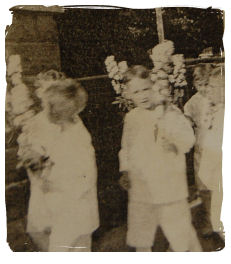
In 1940 the Nazareth Trade School was closed because the attendance had dropped below the number necessary to maintain the institution.
During World War II the army took over the building and grounds for use as a training center for the air force.
On June 18, 1946, at a Special District Meeting, School District No. 22 voted to purchase the Nazareth Trade School Property of 21,884 acres for $100,000 to be used as a site for a new school building. The district then rented the Nazareth Trade School to the State of New York to be used for its expanding program in the Long Island Agricultural and Technical Institute. Classes are still being held there.
Ernest is pictured here marching in one of the Decoration Day Parades
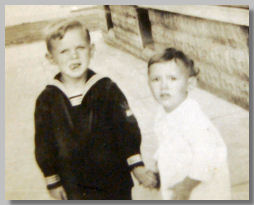 My mother died
when I was three; Joe was five and my sister was one.
My father tried to hire people to take care of us while he
worked because he had already been off work a long time
tending to my mother during her illness. But he
couldn't find trustworthy people that cared enough to take
care of us without robbing our house. So a
priest-friend convinced him to leave my sister with the
grandma and take me and my brother to the Nazareth Trade
School. I saw my sister very little. Traveling
the fifty miles was too costly for my grandmother. The
nuns were wonderful ladies. Most of them were from
Germany.
My mother died
when I was three; Joe was five and my sister was one.
My father tried to hire people to take care of us while he
worked because he had already been off work a long time
tending to my mother during her illness. But he
couldn't find trustworthy people that cared enough to take
care of us without robbing our house. So a
priest-friend convinced him to leave my sister with the
grandma and take me and my brother to the Nazareth Trade
School. I saw my sister very little. Traveling
the fifty miles was too costly for my grandmother. The
nuns were wonderful ladies. Most of them were from
Germany.

